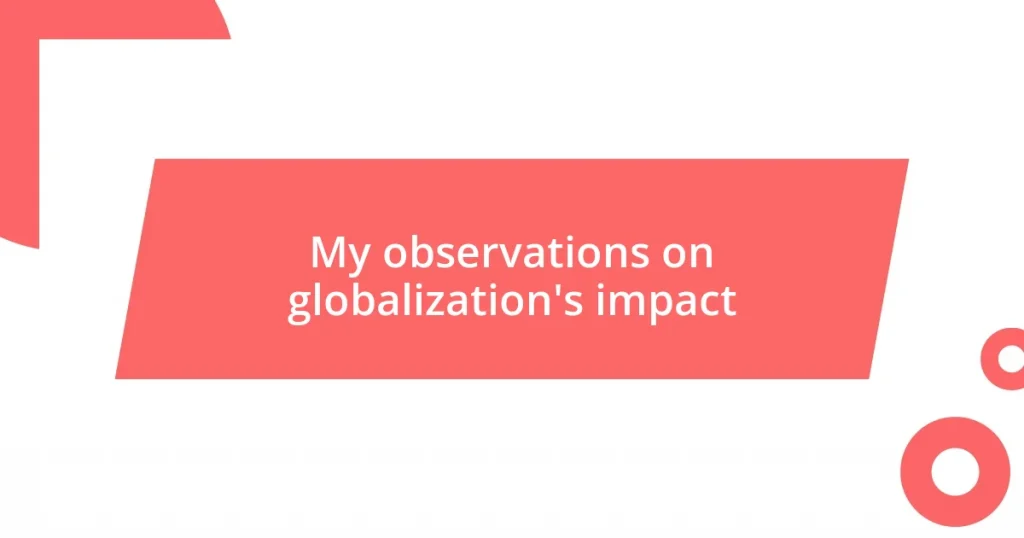Key takeaways:
- Globalization fosters cultural exchange and interconnectivity but complicates local identities and traditions.
- Economic impacts include job creation in developing nations alongside wage disparities in industrialized countries.
- Environmental consequences of globalization highlight the urgency for sustainable practices amidst increasing global trade and consumption.
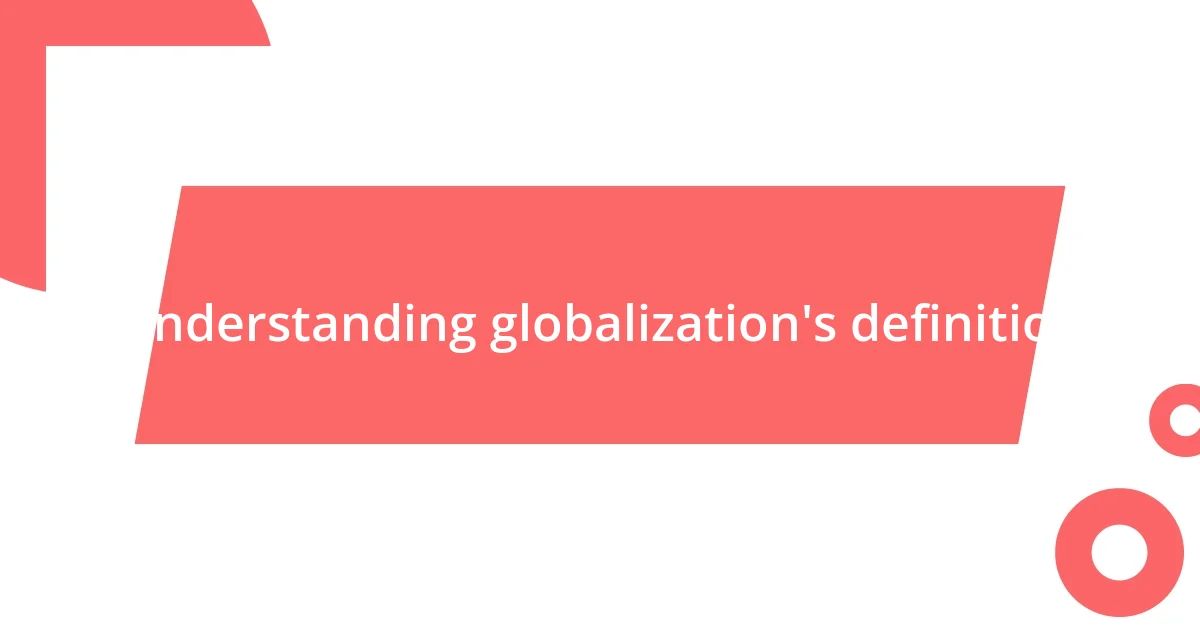
Understanding globalization’s definition
Globalization, at its core, refers to the interconnectedness of economies, cultures, and societies across the globe. I often find myself reflecting on how a simple coffee shop in my neighborhood sources beans from South America while embracing flavors from around the world. Isn’t it fascinating how these global ties shape our daily experiences?
When I think about globalization, I can’t help but recall my travels abroad. Each time I’ve visited a new country, I’ve encountered not just their rich heritage but also the influence of faraway cultures. It really strikes me—how can we define a place by its traditions when parts of its identity are so deeply entwined with others? This amalgamation makes the world feel smaller but also highlights the complexity of local and global identities.
In essence, globalization is more than just trade; it’s a significant cultural exchange. I remember chatting with a friend from India who was surprised at how much American pop culture had permeated his life, yet he introduced me to Bollywood films that I’d never heard of. It’s moments like those that reveal the dualities of our global landscape, pushing us to reevaluate what we think we know about each other. Why does that blend of cultures often lead to misunderstandings, yet it also fosters such rich dialogue?
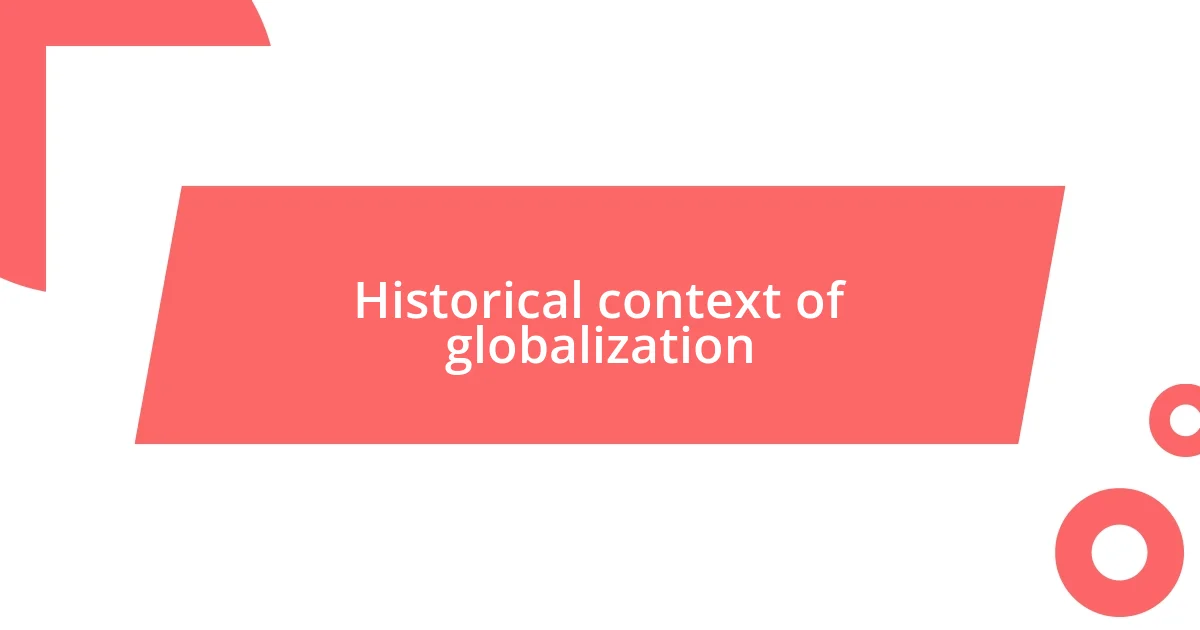
Historical context of globalization
Globalization didn’t happen overnight. Its roots can be traced back to ancient trade routes like the Silk Road, where goods, ideas, and cultures traveled vast distances. I remember standing in a bustling market in Marrakech, surrounded by vibrant fabrics and spices, knowing that these items likely had traveled great distances themselves. The sense of history in those trade exchanges I witnessed made me ponder the stories behind each item.
- The Age of Exploration in the 15th and 16th centuries marked a significant expansion of global interactions.
- The Industrial Revolution in the 18th and 19th centuries catalyzed advancements in transportation and communication.
- The post-World War II period saw international institutions forming, promoting economic interdependence.
- The rise of the internet in the late 20th century drastically accelerated the pace of globalization.
Thinking about these developments, I realize how interconnected our lives have become. It’s both thrilling and overwhelming. Each historical step not only reshaped economies but also intertwined our cultures, showing how history is a continuous thread that weaves us all together.
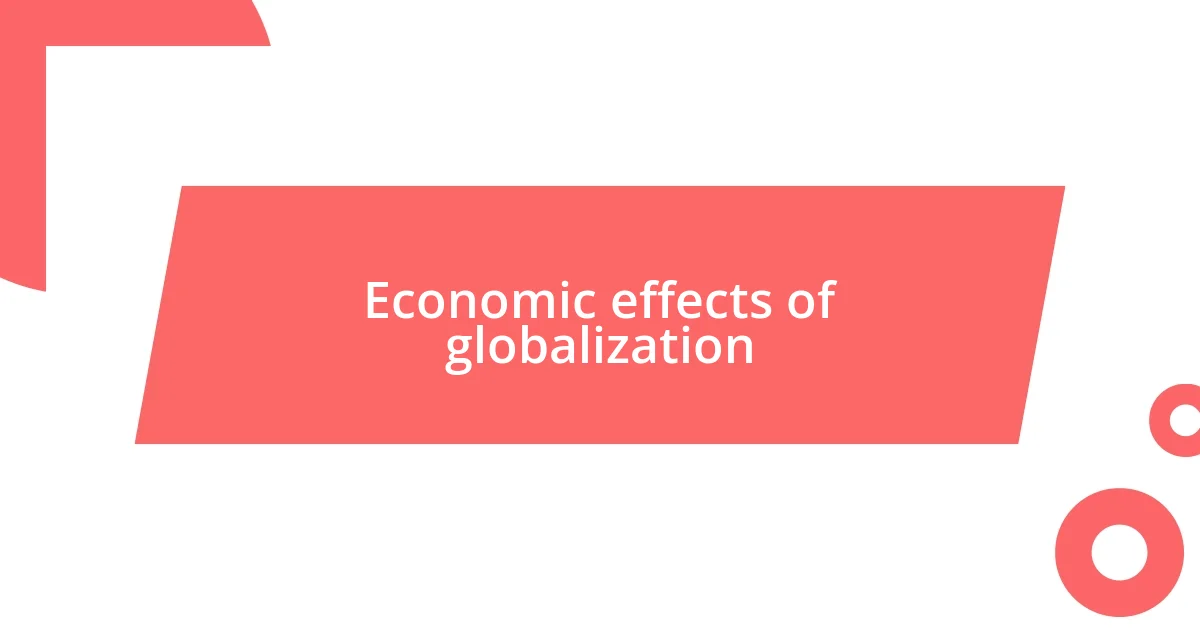
Economic effects of globalization
Globalization has undeniably reshaped economic landscapes across the globe. I’ve often noticed that as businesses expand their reach, they tap into new markets, which can lead to increased profits and innovation. For instance, when I visited a local tech startup, I learned how they relied on international partnerships to develop their products, merging diverse ideas and talents that would have been impossible without globalization. It’s remarkable how collaboration can lead to breakthroughs that benefit us all.
In my experience, globalization also plays a significant role in wage disparities. On one hand, it creates jobs in developing countries, lifting many out of poverty; on the other hand, it can lead to wage stagnation in more industrialized nations. When I spoke with a friend working in manufacturing, she expressed her concern about the impact of cheaper labor abroad, which puts pressure on local wages. It’s this delicate balance that often sparks debates about fairness in the global economy.
Moreover, I’ve seen firsthand how globalization connects supply chains, making goods available worldwide. While walking through a supermarket, I marveled at the variety of products imported from various countries; it felt like a mini world tour in the grocery aisle. Yet, this convenience can also lead to economic fragility. If a crisis strikes in a particular region, the ripple effect can disrupt global supply chains, reminding us of how interconnected we truly are.
| Positive Effects | Negative Effects |
|---|---|
| Job Creation in Developing Nations | Wage Disparities in Developed Countries |
| Innovation Through Collaboration | Economic Fragility of Global Supply Chains |
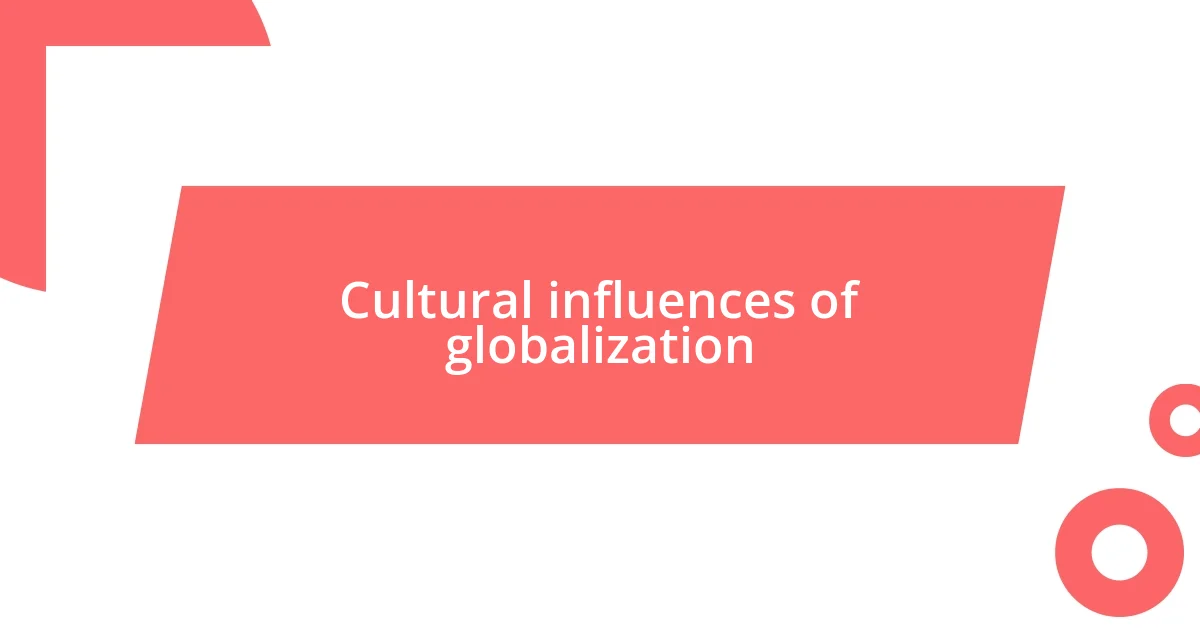
Cultural influences of globalization
Globalization has deeply influenced cultural landscapes, introducing a melange of traditions and practices that shape our everyday lives. I often think about my experience watching a lively street festival where local music mingled with hip-hop from various cultures. It struck me how powerful music can be in bridging gaps and uniting people, regardless of their backgrounds. Isn’t it fascinating how a simple beat can evoke such a spectrum of emotions and resonate with diverse audiences?
When I visit restaurants offering fusion dishes, it’s a tangible reminder of how globalization reinterprets and celebrates cultural identity. One memorable night, I savored a taco filled with Korean BBQ flavors. This culinary adventure made me realize that these blends are not merely about food; they represent stories of migration and adaptation. It’s much like listening to a song in a different language; the notes and rhythms ripple through us, highlighting a shared human experience. Have you ever tried something that challenged your taste buds but felt completely right at the same time?
Despite these enriching exchanges, I sometimes feel a sense of loss regarding local traditions. For instance, while traveling in Italy, I witnessed local artisans struggling to keep their crafts alive amid mass-produced goods. It saddened me, knowing that as cultures blend, some unique identities may fade. Isn’t it crucial to find a balance between embracing global influences and preserving our roots? This duality of exposure and preservation is a poignant aspect of our globalized world, prompting me to reflect on what we value and choose to carry forward in our cultural legacies.
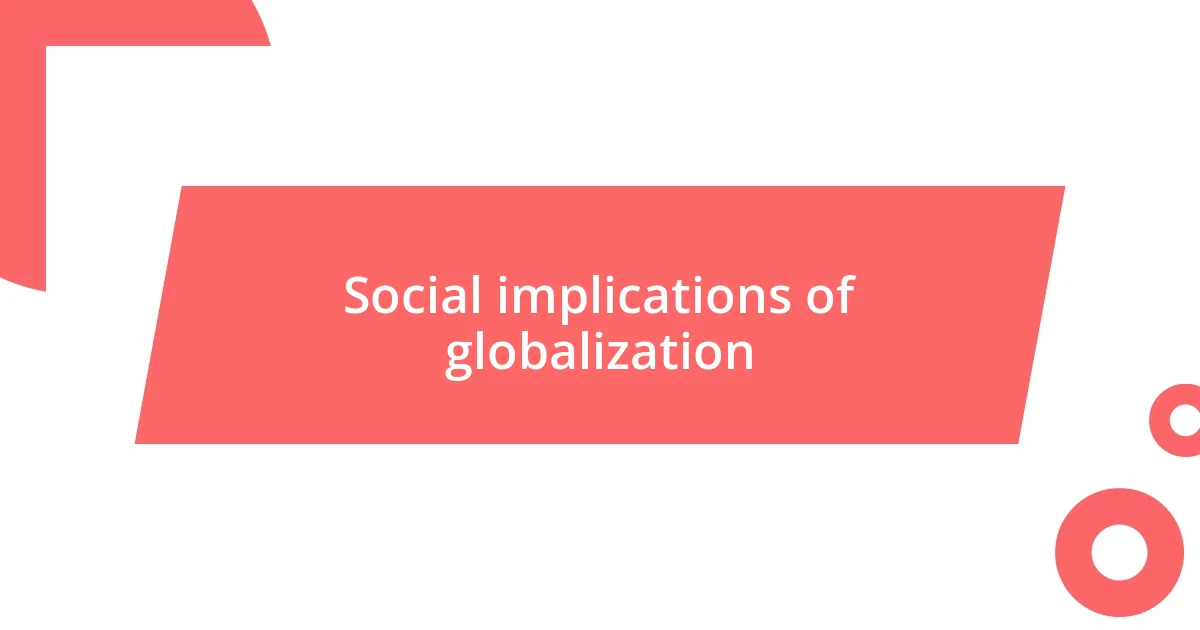
Social implications of globalization
Globalization has a profound effect on the social fabric of our societies, often blurring traditional boundaries. When I attended a community meeting that focused on integrating immigrants, I witnessed how diverse cultures cultivate a vibrant social tapestry. Yet, it also prompted a thought – how do we ensure that newcomers feel welcomed while maintaining a sense of community for those already established?
In my neighborhood, I’ve observed the rise of multicultural events that celebrate various heritages, from food festivals to artistic performances. Participating in one such festival left me energized, as the blending of different traditions beautifully illustrates the shared humanity among us. But I couldn’t help but wonder about the challenges of cultural appropriation. How can we enjoy and borrow from different cultures without crossing the line into exploitation?
Moreover, the increasing interconnectedness has sparked changes in social norms and values. I remember chatting with a friend about how social media allows us to connect with people worldwide, shaping our views and lifestyles. It’s fantastic to share experiences, but it also makes me question: Are we losing the essence of local customs that once defined us? Balancing global influences with the nuances of our local identity is crucial, and it’s a conversation worth having in today’s rapidly evolving world.
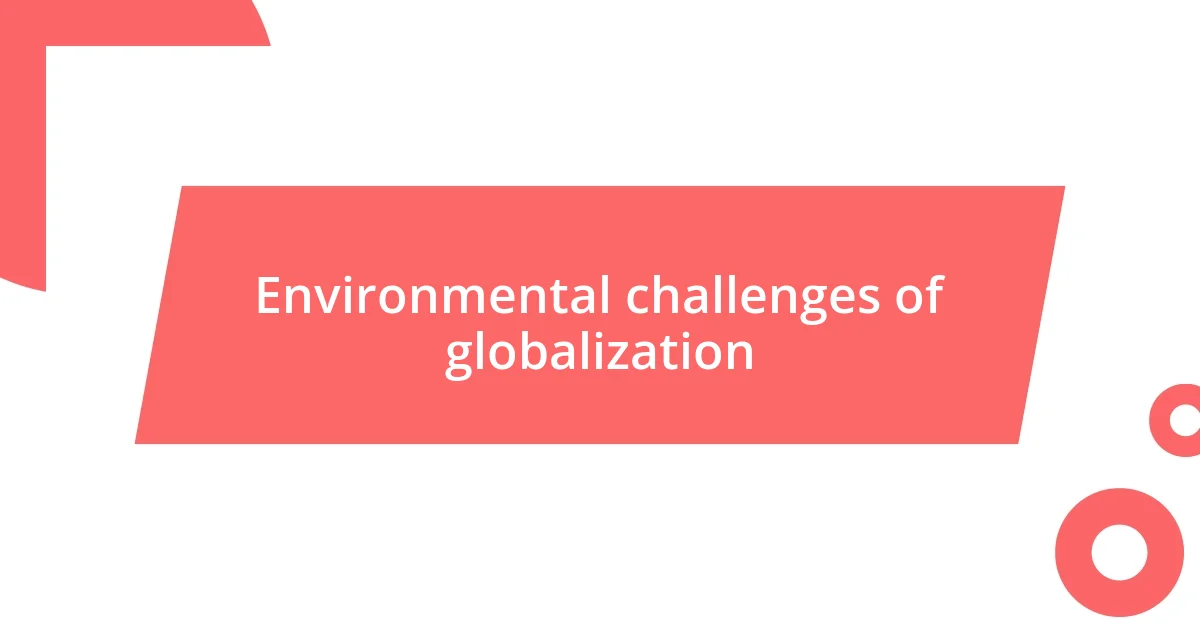
Environmental challenges of globalization
The environmental challenges of globalization are striking, often taking a backseat in discussions about its benefits. I remember a road trip I took to a once-pristine beach that had become overwhelmed by plastic waste, a harsh reminder of how interconnectedness can lead to environmental degradation. It made me wonder: how can our global appetite for convenience and cheap goods overshadow the need for sustainable practices?
As I dive deeper into this topic, it’s clear that globalization accelerates deforestation and habitat loss. Just last year, while hiking in a previously untouched forest, I was taken aback by the signs of logging activities that had invaded the area. The sheer loss of biodiversity struck a chord with me, provoking a question: is it worth sacrificing our natural ecosystems for economic gain? Recognizing the loss of these natural sanctuaries evokes a sense of urgency, urging me to advocate for more environmentally sound trade practices.
Worse still, I’ve observed firsthand how climate change is often exacerbated by globalization. During a visit to a coastal town, I met fishermen lamenting the irregular fish patterns caused by rising sea temperatures—an issue directly linked to global industrial emissions. Their stories resonated within me, highlighting a stark reality: the ripple effects of our global economy are felt most acutely by those who rely directly on the earth’s resources. This paints a clear picture—globalization’s reach has consequences, and addressing these challenges must become a priority for all of us.
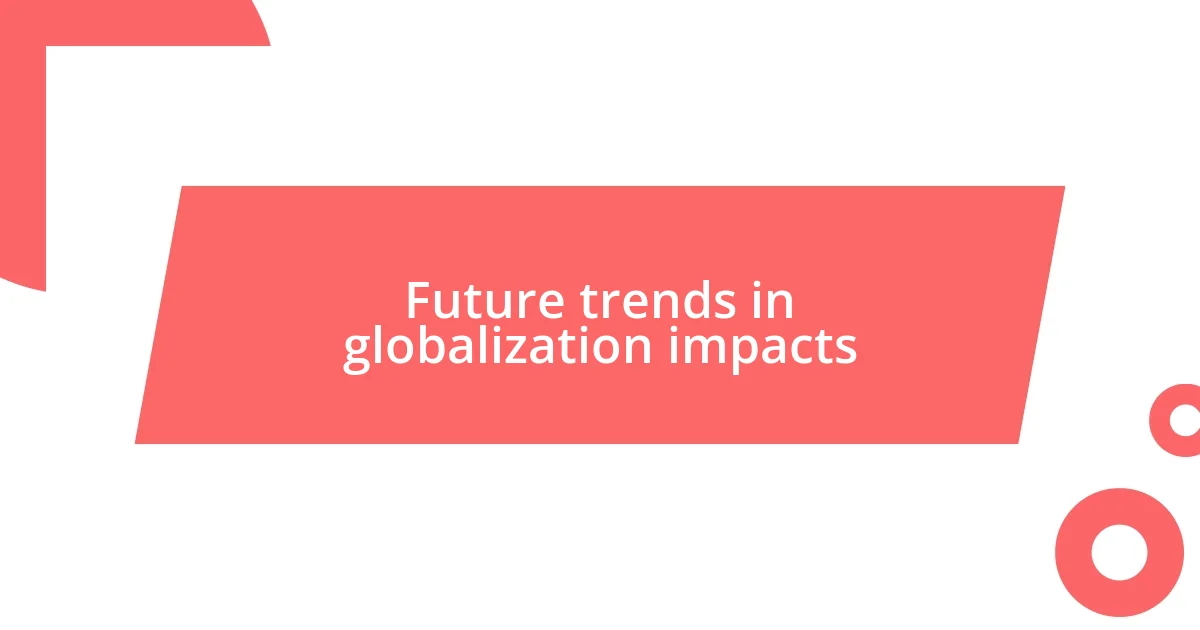
Future trends in globalization impacts
The future of globalization is likely to reshape economic landscapes further, with digital innovation at its forefront. I recently attended a tech conference that showcased emerging technologies, and I couldn’t help but marvel at how artificial intelligence and blockchain could streamline global trade. But this raises a question: will these advancements benefit all, or will they widen the gap between those who can access technology and those who cannot?
On a personal note, I have witnessed the growing trend of remote work, which globalization has made possible. When talking with friends from different corners of the world, we often share our experiences of working together virtually, blending various time zones into a cohesive team. This raises a pivotal thought: as individuals increasingly collaborate across borders, how do we ensure that cultural differences enrich our work rather than complicate it?
Moreover, I believe future globalization trends will necessitate a rethinking of consumer behaviors. I remember feeling conflicted after discovering that my favorite brand’s products were linked to poor labor practices overseas. This revelation sparked an internal dialogue: how does my purchasing power contribute to a global economy? I feel a growing responsibility to support businesses that prioritize ethical practices, suggesting a movement towards more mindful consumerism in the future.










